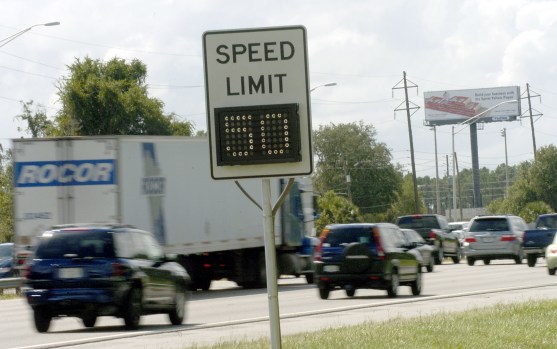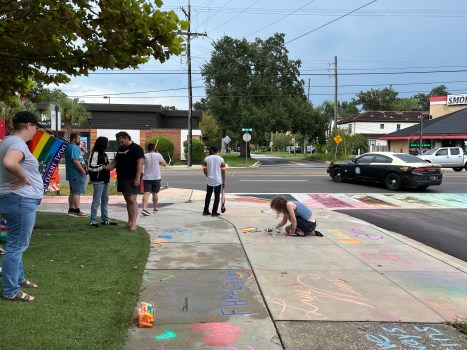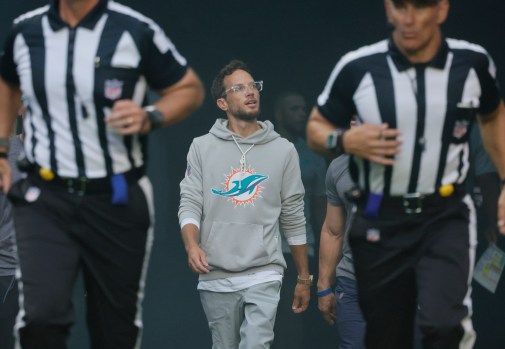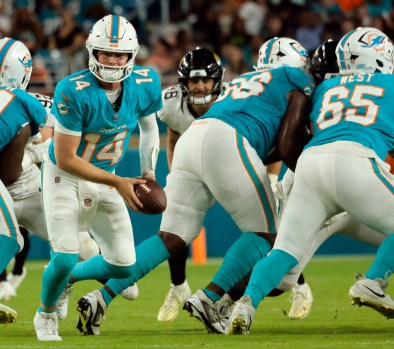An Orlando man was arrested after a trooper measured him going 155 mph on the interstate — and a new law classifying him as a “super speeder” could mean time behind bars and a court date.
The state’s Dangerous Excessive Speeding
law
went into effect on July 1, imposing stricter penalties for anyone convicted of exceeding the speed limit by 50 mph or driving over 100 mph in a reckless manner.
In the first 21 days since its implementation, Lt. Jim Beauford of the Florida Department of Highway Safety and Motor Vehicles said law enforcement officers have issued at least 61 citations for people driving 50 mph or more over the speed limit — an average of almost three people per day.
Among those running afoul of the law was 20-year-old Octavius L. Hunt Jr., who was arrested by the Florida Highway Patrol early Sunday morning in Seminole County while driving 155 mph on I-4 — 95 mph above the posted speed limit of 60 mph.
When troopers approached his white Dodge Challenger, he said he thought he was “only doing 80 miles per hour,” according to the arrest report.
One of the arresting troopers said he thought Hunt was trying to “demonstrate the abilities” of his Challenger to the three other passengers in the car.
If he was pulled over under the same circumstances less than a month ago, state law would have required him only to pay a fine. Now, drivers going 50 mph or more over the speed limit face a possibility of jail time.
Under the new law, anyone convicted for the first time would be required to pay a $500 fine and/or spend up to 30 days in jail. Any second-time offenders would have to pay double that amount and/or spend up to 90 days in jail. If violators were convicted a second time within five years, their license would be revoked for at least 180 days but no more than a year.
The law, filed by Rep. Susan Plasencia, R-Winter Park, in order to help stop excessive speeding, passed unanimously in the Senate, but was less popular within the House, where it was approved on a 75-38 vote with many Democrats and a few Republicans against it.
Central Florida Rep. Anna Eskamani, D-Orlando, one of the “no” votes, said she was concerned people could be “overly criminalized for speeding.”
“[I’m] also concerned about its misapplication with immigration enforcement, which we are seeing now,” she added.
An Orlando Sentinel investigation
found that 55% of ICE detainees in Lake, Osceola and Seminole County jails earlier this year were arrested during vehicle stops.
But arresting agencies, including the one that arrested Hunt, were in agreement with the bill’s purpose: to stop speeders.
“We do feel like it’s needed,” Florida Highway Patrol Lt. Tara Crescenzi said. “We’re seeing people that are traveling more than 100 miles per hour on the interstate, they’re cutting through traffic, they’re driving aggressively, they’re tailgating and those are all very dangerous behaviors”
In Orange County, the sheriff’s office saw its first case just minutes after the law was implemented when a deputy saw a driver going 104 mph in a 70 mph zone at 12:02 a.m. July 1.
In a
video posted
to X, a deputy is seen saying, “As of three minutes ago, it is now an arrestable offense.”
While the deputy went easy on that poorly-timed speeder and
didn’t arrest him
, he paid a hefty fine.
As for Hunt, one of the Seminole County Sheriff’s Office’s most recent “super speeder” cases, he faces both speeding and street racing charges, and will have his car impounded for 30 days.
A Seminole County Sheriff’s Office official said he bonded out of the jail Sunday night by paying $1,000, $500 for each charge.










